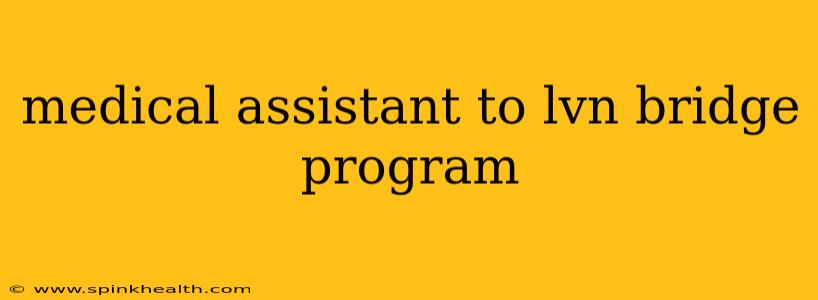Charting a Course: Your Journey from Medical Assistant to Licensed Vocational Nurse (LVN)
The crisp white coat, the reassuring smile, the steady hand – you've already tasted the rewards of a medical career as a Medical Assistant (MA). But the call to do more, to provide even more direct patient care, is strong. You envision yourself as a Licensed Vocational Nurse (LVN), a pivotal role in the healthcare system. The path ahead might seem daunting, but the bridge program from MA to LVN offers a streamlined route to achieving your ambitions. Let's explore this exciting transition.
What is a Medical Assistant to LVN Bridge Program?
This isn't just another nursing program; it's a carefully designed pathway that leverages your existing medical knowledge and skills. Imagine this: instead of starting from scratch, you build upon your foundation as an MA. These programs recognize your prior experience, often granting you credit for completed coursework or practical experience, leading to a shorter, more focused curriculum. This means less time in school and a faster path to your LVN license.
What are the Prerequisites for a Medical Assistant to LVN Bridge Program?
This is where your MA experience shines. Most programs require a completed Medical Assistant program and often a certain number of hours of work experience. They’ll want to see evidence of your competency in clinical skills, medical terminology, and patient care. Specific prerequisites vary between institutions, so thoroughly researching individual programs is crucial. Common requirements include:
- Completed MA certification or diploma: Your certification shows that you've met certain educational standards and can handle the demands of a healthcare setting.
- Minimum work experience as an MA: Practical experience is key; the number of hours required will vary by program.
- Passing scores on entrance exams: These exams often test your aptitude for nursing and your knowledge of fundamental medical concepts.
- Minimum GPA: A strong academic record demonstrates your commitment to learning and your ability to succeed in a challenging program.
How Long Does a Medical Assistant to LVN Bridge Program Take?
The duration is significantly shorter than a traditional LVN program, typically ranging from one to two years. This accelerated pace is possible because of the credit given for your previous MA education and experience. However, the program is still rigorous, demanding dedication and hard work.
What Courses Are Typically Included in a Medical Assistant to LVN Bridge Program?
While the specific courses vary between institutions, you can generally expect a curriculum that builds on your MA knowledge and skills, focusing on the advanced aspects of LVN practice. Common courses include:
- Pharmacology: In-depth study of medications and their effects.
- Medical-Surgical Nursing: Comprehensive care for patients in various medical-surgical settings.
- Maternal-Child Nursing: Care for mothers and newborns.
- Geriatric Nursing: Care for the elderly population.
- Mental Health Nursing: Understanding and caring for patients with mental health conditions.
- Advanced Medical Assessments: Developing critical thinking skills for accurate patient assessment.
What are the Career Opportunities After Completing a Medical Assistant to LVN Bridge Program?
Becoming an LVN opens doors to a wide range of opportunities. You'll be qualified for various healthcare settings, including:
- Hospitals: Providing direct patient care alongside registered nurses and doctors.
- Clinics: Offering comprehensive nursing care in outpatient settings.
- Nursing homes: Caring for elderly patients.
- Home healthcare: Providing in-home nursing services.
What is the Difference Between an LVN and an RN?
This is a crucial distinction. LVNs work under the supervision of physicians, RNs, or other licensed healthcare professionals. Their responsibilities focus on direct patient care, including medication administration, wound care, and monitoring vital signs. Registered Nurses (RNs) have a broader scope of practice, more autonomy, and typically manage more complex patient cases.
Is a Medical Assistant to LVN Bridge Program Right for Me?
Consider your career goals, your learning style, and your dedication to education. If you're a dedicated and motivated MA who's ready to take the next step, a bridge program can be a rewarding path toward your nursing career.
This journey from MA to LVN is a testament to your commitment to healthcare. With dedication and the right preparation, you can successfully navigate this bridge program and embark on a fulfilling career as a Licensed Vocational Nurse. Remember to research programs thoroughly, considering location, cost, and program structure to find the perfect fit for your individual needs.

